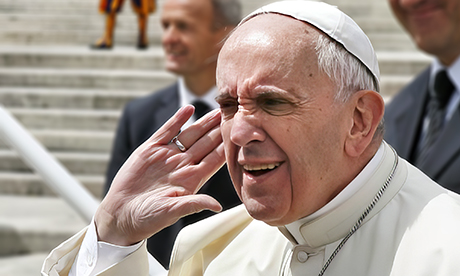Pope Francis on Friday said he was told the synod process was an “impolite word.”
The comments, directed at the pope, came as he entered the Vatican audience hall for a meeting.
Francis said as he entered the Vatican audience hall for the meeting, someone – using an Argentinean phrase that is not very polite, nor is its translation in Italian – told him that the whole synod process is ‘creating a mess’.
Quick to reply, the pope observed that if the synod is “a blank, Pentecost morning was even worse. It was total disorder.”
“And who provoked that mess? The Holy Spirit.”
“Don’t be afraid when there is disorder provoked by the Spirit,” Francis said.
One need fear “only when it is provoked by our selfishness or the spirit of evil.”
“He’s good at creating disorder to move people. But the same Spirit also provoked harmony.”
Francis warned that “a church weighed down by structures, bureaucracy and formalism will struggle to walk in history at the pace of the Spirit, meeting the men and women of our time.”
“The great enemy of this process,” he said, “is fear.”
Commenting on concerns around the involvement of priests and laypeople and on the experiences of marginalisation, Francis said unity and shared responsibility are essential.
An “always lurking” temptation is to rely on “a few ‘qualified actors’ who carry out pastoral activity” while the rest of the faithful stand by and watch.
“Sometimes one gets the impression that religious communities, chanceries and parishes are still too self-referential,” Francis said.
Warning that there seems to be some kind of covert “defensive neo-clericalism,” he called clericalism in all its forms a perversion.
Clericalism in all its forms is “generated by a fearful attitude, by complaints that the world does not understand us anymore, that young people are lost, and by a need to reiterate and make one’s influence felt.”
Promoting co-responsibility in the church, he said, is not simply a matter of finding a new way to “distribute power,” said the pope.
Rather, he said, it means learning how to recognise the gifts of each person, particularly those “who still struggle to see their presence recognised in the church, those who do not have a voice, those whose voices are drowned out or even silenced or ignored, those who feel inadequate perhaps because they have difficult or complex life paths (and) are sometimes almost ‘excommunicated’ a priori.”
Source: NCR
Additional readingNews category: World.




